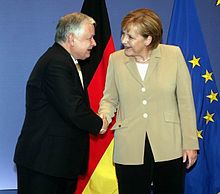EU summit 2007
The 2007 EU Summit took place from June 21-22, 2007 in Brussels , Belgium . The German Chancellor Angela Merkel chaired the meeting .
Topics and participants
The central topic of the meeting was the negotiation of a new basic EU treaty to replace the failed EU constitution .
The European constitution had previously failed due to the veto of the Dutch and French . The most important conflict of the three-day summit was Poland's resistance to the planned voting procedure of the “double majority” in the European Council . Chancellor Merkel tried to find a compromise on the basic treaty in a confessional procedure with several heads of state and government.
The failure of the EU constitution in referendums in France and the Netherlands had paralyzed the EU in 2005. The European heads of state and government only resumed negotiations in 2007. Poland and Great Britain expressed the greatest reservations during the summit. Poland complained of being at a disadvantage compared to larger states such as Germany and France due to the planned new voting system of the double majority. In the course of the negotiations, Chancellor Merkel had threatened Polish President Lech Kaczyński that she would seek an agreement without Poland. Many summit participants were annoyed that it was not Lech Kaczynski who had to decide on the negotiations, but his brother and Polish Prime Minister Jarosław Kaczyński in Warsaw . Luxembourg's Prime Minister Jean-Claude Juncker said: “At times I felt it was unreasonable, even for the very cleverly behaved Chancellor, that you should not send someone to the negotiating table who can raise or tilt your thumb, but rather that you send your brother . “The heads of state and government finally reached a compromise and agreed to postpone the introduction of the" double majority "voting system from 2009 to 2014, with a transition period until 2017. This agreement enabled Poland to retain its disproportionate number of votes in the European Council exercise for another ten years.
Prime Minister Blair had insisted on the demand that the Charter of Fundamental Rights of the European Union “should not create enforceable law in Great Britain”. In contrast, representatives of other Member States emphasized that the legally binding nature of the Charter was particularly important to them. You had already criticized the proposal not to include the Charter of Fundamental Rights in the Treaties, but to establish its legally binding effect by means of a cross-reference. Furthermore, Blair demanded that the title of the planned EU foreign minister should be restricted to high representative of the EU for foreign and security policy . Blair's demands were related to the desire not to hold a referendum on EU reform in the UK. For this reason the particularly far-reaching provisions on fundamental rights and foreign policy had to be weakened from the British perspective. After lengthy discussions, the heads of state and government finally agreed that Great Britain could take a “reserve position” in foreign and security policy and abstain from parts of the common domestic and judicial policy. After the conference, French President Nicolas Sarkozy said on the Charter of Fundamental Rights: "It will not affect the UK". At the same time, the heads of state and government decided that when the reform treaty came into force in 2009, the EU would have a high representative for foreign and security policy, who as Vice-President of the EU Commission would assume the role of EU foreign minister.
All heads of state and government expressed their satisfaction after the agreement. Chancellor Merkel spoke of “clear, important progress for the European Union”. It was important "that we get out of the rigidity," Merkel continued. She is confident that the new EU treaty will now come into force in 2009 as planned: “We have managed to lead the 27 member states on a path that is not very easy.” There is a willingness to compromise “to the end maxed out, ”she affirmed.
Individual evidence
- ↑ a b Steinmeier cannot understand Kaczynskis. EU summit. focus.de, June 25, 2007, accessed on August 31, 2016 .
- ↑ a b Merkel reaches compromise with Poland. EU basic treaty. focus.de, June 23, 2007, accessed on August 31, 2016 .
- ^ A b Difficult negotiations in Brussels. European Council. faz.net, June 22, 2007, accessed August 31, 2016 .
- ↑ a b c d Breakthrough at EU summit - success for Merkel. Reform agreement. spiegel.de, June 23, 2007, accessed on August 31, 2016 .
- ↑ Polish magazine mocks Merkel. EU summit review. focus.de, June 26, 2007, accessed on August 31, 2016 .
- ↑ Deep disgruntlement with the Kaczynskis. welt.de, June 25, 2007, accessed on August 31, 2016 .
